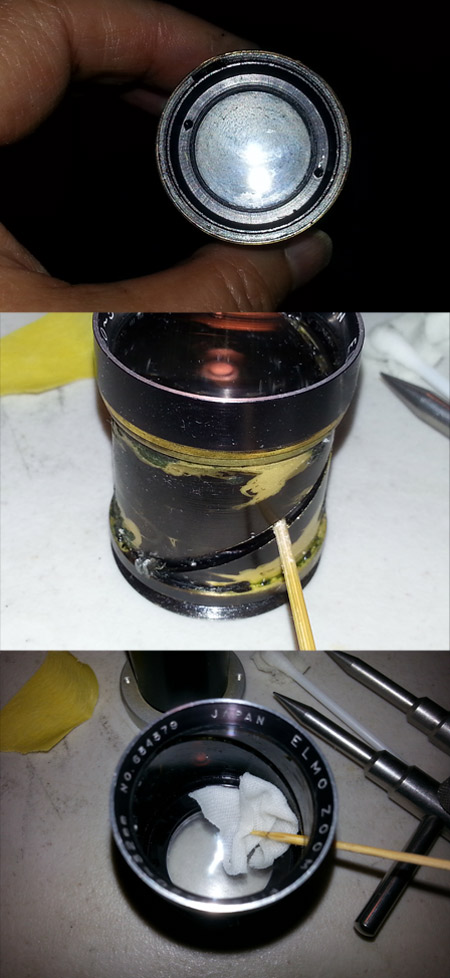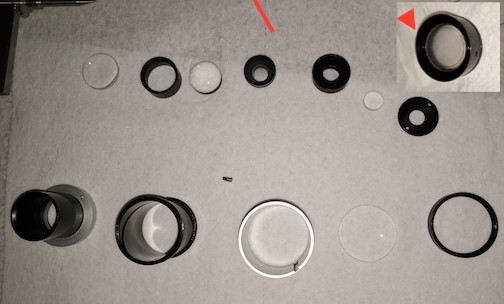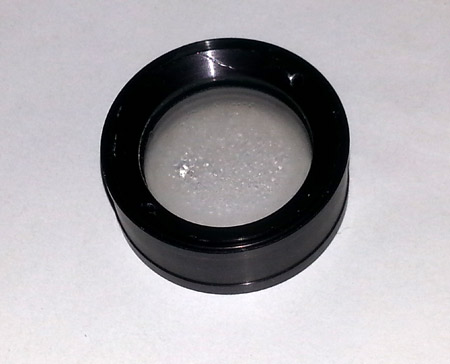This is topic Elmo FP-C Zoom Lens Repair in forum 8mm Forum at 8mm Forum.
To visit this topic, use this URL:
https://8mmforum.film-tech.com/cgi-bin/ubb/ultimatebb.cgi?ubb=get_topic;f=1;t=011394
Posted by Nate Gambill (Member # 5837) on April 01, 2017, 11:12 AM:
I've recently gotten into the 8mm world.
My Kodak died and I acquired a nice Elmo FP-C, but it has a badly clouded lens.
I've done some photographic lens repair, but I cannot get the spanner ring off the front of the lens. I have a good quality spanner, but the ring appears to have been locked with adhesive. I'm afraid to heat this to break the seal for fear of doing further damage.
Has ANYBODY successfully done a repair on this lens and would you be willing to share your experiences?
OR does anybody still have one of these F1.3 20-32mm zoom lenses?
Thanks in advance!
(same lens as in the topic: WANTED: Lens for an Elmo FP-A or known substitute lens)
Posted by Janice Glesser (Member # 2758) on April 01, 2017, 04:53 PM:
Hi Nate and Welcome! You are experiencing a common problem with these FP Series lenses. I wish I had some good news for you...but I'm afraid even if you could get the spanner removed and cleaned the lens...it probably wouldn't remove the cloudiness. It appears itched into the glass. I have 3 of these lenses that I have tried to clean. I can remove the dirt...but not the cloudiness.
As like you...I have not been able to remove the spanner. However I have come up with a work-around to get to the internal side of the lens.
Don't laugh...it works....
Take a small piece of fabric with your lens cleaning chemical applied (I used a T-Shirt) and with a toothpick push the fabric into the slot on the side of the barrel. Move the fabric with the toothpick over the lens...remove the lens cleaning cloth...and then insert a dry cloth to wipe off the solution.
If you have a solution that will remove the cloudiness please let me know. This little technique should work. I have done this with lenses from other projectors with good results. However, like I said I have had no luck cleaning this FP Series lens.

Posted by Richard Whitman (Member # 5849) on April 01, 2017, 05:38 PM:
Were you able to get a good grip on those pin holes with your spanner? A watch opener could work better.
Posted by Tom Spielman (Member # 5352) on April 01, 2017, 09:26 PM:
Can't help you getting it apart but when traditional lens cleaners would not remove the cloudiness from an element of a lens I was trying to repair, I soaked it in a mixture of peroxide and windex (with ammonia) for about 5 minutes. It did the trick.
Maybe Janice's toothpick and cloth method would work with the peroxide mixture but obviously you won't be able to soak it unless you get it apart.
Good luck !
If you do have some success, please post back. It may help someone else down the road.
Posted by Janice Glesser (Member # 2758) on April 01, 2017, 11:03 PM:
Tom...I'm going to try the Peroxide and Windex solution. I'll just dip the entire lens holder into the solution. The solution will get on the internal side of the lens thru the slot on the side. It's worth a try.
Posted by Tom Spielman (Member # 5352) on April 02, 2017, 11:43 AM:
I hope it works for you Janice. I can't remember what ratio I used but I do remember that I let the lens element soak for about 5 minutes.
In the case of my lens I suspect the cloudiness was caused by a film of oil. I don't know that for sure but the reason I was pulling it apart was because there was oil on the aperture blades causing them to stick, - a pretty common problem.
When I was researching for something to clean it with I ran across all sorts of recommendations for various things, - Ponds Cold Cream and Lighter Fluid (Naptha) being two others that were recommended most frequently. Ponds was going to be what I tried next. That might be hard with the stick and cloth method though.
If the lens still worked pretty well in spite of the cloudiness, I don't know that I'd try the cold cream. Seems like it could scratch. I had gotten the lens more or less for free so I was willing to experiment.
Good luck !
Posted by Janice Glesser (Member # 2758) on April 02, 2017, 12:57 PM:
Thanks Tom for the details and additional cleaning alternatives. I'm trying to think positive and I need to buy some Peroxide ![[Smile]](smile.gif) However... if the cloudiness in these Elmo lenses is actually etched into the lens...then nothing will fix that.
However... if the cloudiness in these Elmo lenses is actually etched into the lens...then nothing will fix that.
If the lens is just a little cloudy it is still usuable. The lamp is a bright 150 watts.
Posted by Nate Gambill (Member # 5837) on April 02, 2017, 06:21 PM:
I will try the chemical fix to see if that might help. I have been able to disassemble the entire lens except the sliding element (see picture insert).
Are there any interchangeable lenses that I could substitute?
Thanks for all of your input!

Posted by Tom Spielman (Member # 5352) on April 02, 2017, 07:24 PM:
How did you get it apart Nate?
Posted by Nate Gambill (Member # 5837) on April 02, 2017, 07:58 PM:
Before you start disassembly, make sure you can place the parts on a clean surface and follow the practice of placing all parts in the order removed and in the same orientation as removed.
I had to apply alcohol (90% if you have it) to the threaded elements to loosen any thread locker that might have been there. I had to let mine sit for a couple hours and multiple treatments
Then I was able to remove the front lens ring with a rubber pad pressed against the ring. That releases the front lens element (away from projector)
Then the projector side also has a ring that requires a spanner. Once removed you can remove the small lens elements.
Readjust the spanner and remove the silver ring attached to the black tube that goes in the projector. This part has a lens that appears to be glued in place and is not removable, but can be cleaned.
Removing that part allows you to slide the zoom element and slide ring from the front of the lens body. In the slide ring is a lens and a screw that slides in the zoom ring. Remove that screw (small regular screwdriver). This allows you to remove the inner element. (use protective gloves as the inner element is GREASY).
I have NOT been successful in separating the lock ring on this inner element, so I can't clean the inside. It appears that the heat has vaporized some of the grease that gets into the element through the holes for the spanner wrench.
I am attempting the "soaking" process you recommended to clean the inner elements. If that doesn't work, I AM going to heat the outer part of that ring and then see if I can break that spanner lock ring loose.
I'll try to shoot pictures of the re-assembly process and post them. I could not find ANY diagrams of this lens.
Posted by Janice Glesser (Member # 2758) on April 04, 2017, 12:31 PM:
Hi Nate...as you suggested by removing the screw from the zoom lens I was able to remove it from the barrel. I can now see that there are 2 lenses in the casing...which explains why I didn't see any results from cleaning the outer edges. I can not budge either of the spanner rings. I have heated it with a hairdryer and soaked it in alcohol with no success. Elmo must have not wanted you to ever get to these lenses.
Have you had any luck?

Posted by Phil Murat (Member # 5148) on April 04, 2017, 01:04 PM:
Hello Janice,
I have not dismantled any Elmo lens yet, but providing the housing (picture above) is aluminium material, there is a "Touchy" optional solution :
1) Protect Lenses with tape
2) Manage holes set (4, 6....) Diam max 2mm on internal ring and a medium circumference, controlling holes depth of course....
3) Manage a strong "pinch" device (Aluminium too) perfectly adjusted for Outer ring.
4) Manage a special spanner with small steel pins diam 2mm (same pin number than holes) on same circumference.
I acknowlege this is not an easy job to do and which need a "Divider" (for milling machine), a lath, to get an excellent result.
Disassembly could be done with both tools made through 3) & 4)
Posted by Joe Taffis (Member # 4) on April 04, 2017, 02:05 PM:
Hi Janice,
Along with alcohol (I use the 91% strength), you may want to try some "Goo Gone" on a swab. I remember you used that before for something. It worked for me on a lens disassembly, but I've never worked on an FP, not yet anyway...
Posted by Janice Glesser (Member # 2758) on April 04, 2017, 10:06 PM:
@ Phil... The outer housing is aluminum...but the rest of the casing is definitely a harder metal.
@ Joe...I did try Goo Gone... didn't phase it a bit ![[Frown]](frown.gif) I haven't tried acetone yet.
I haven't tried acetone yet.
I'm so frustrated ... I feel like taking a hammer to it. Although I'll bet that wouldn't do anything but break the glass. What was Elmo thinking ![[Confused]](confused.gif)
![[Eek!]](eek.gif)
![[Mad]](mad.gif)
![[Frown]](frown.gif)
Posted by Nate Gambill (Member # 5837) on May 06, 2017, 07:49 PM:
I'm going to get aggressive and see what works.
In the interim, is there ANYTHING else that will work in place of this lens? Alternates? I've been hunting for a used one and have been unsuccessful in finding one.
Anybody have a suggestion, or just junk the projector?
Posted by Janice Glesser (Member # 2758) on May 06, 2017, 09:19 PM:
Nate...let me check the lenses I have. Perhaps I can find a lens that is reasonably clear on one of my junkers.
Posted by Janice Glesser (Member # 2758) on May 07, 2017, 12:11 PM:
I checked all the lenses from my non-working Elmo FP's and none were good. I still have a couple working machines, but I only intend on keeping one. The bulbs are very expensive on these projectors. I have done a lamp conversion on my FP-A and that's the one I'll keep for awhile. The FP-C still has the old DCA bulb and that one I'll probably sell.
There are some very nice silent dual format projectors with good lenses that you might want to look for to replace your FP-C.
Posted by Richard Finley (Member # 5965) on June 30, 2017, 01:34 PM:
I just joined this forum since I was looking for a solution the same problem. I acquired a FP-C from an estate sale that appeared to be in excellent condition, but had a cloudy lens. I have finally managed to get it completely apart after soaking it in denatured alcohol for 3-4 days and a quick dunk in acetone. The lens pair that is crimped in the smaller tube was the most challenging. Using an eye loupe and a tiny miniature screwdriver I was able to push the 4 crimps outward far enough to allow the lens to come out. Between the 2 lenses was where all the crud was located. It cleaned up nicely with denatured alcohol. Putting it back together was very tedious, taking care not to slip and scratch the lens. I recrimped the lens in with a little larger screwdriver with the flat in a vertical position. This made a much smaller crimp, but it holds. It is now clear and has a sharp picture. I need to disassemble it again to relube the zoom. What would make a good lube to use?
While it was soaking I also converted it to use an LED lamp. It is now very bright and runs cool with no chance of burning film even on STILL. I can leave it on one frame for extended periods of time now and not worry about heating.
Posted by Janice Glesser (Member # 2758) on June 30, 2017, 09:35 PM:
Welcome Richard. It appears from your testimony it can be done. Should I assume that this is the part you soaked in alcohol for 3-4 days?

When you say a quick dunk in acetone...does that me you just put it into the acetone and pulled it right back out or did you let it sit in the solution for a minute or what?
Since I never got the thing apart...should I assume that the "crimps" (not sure what these are) you are referring to can only be accessed after the lens casing is separated?
If I can get as far as getting the lens apart...I'll take some pics.
Good lubes are SuperLube or White Lithium Grease.
Posted by Richard Finley (Member # 5965) on June 30, 2017, 10:05 PM:
I ended up soaking the whole lense assembly in alcohol. The 'quick dunk' in acetone was for an hour or so. (Quick in relation to 3-4 days). Your pic is the one with the crimps. From what I could tell, that piece is a solid chunk of aluminum even though it has the holes for a spanner. I looked at it with a very high power loupe and could not see any indication of it being 2 pieces. The crimps are on the opposite side holding the second glass in place. They are the tiny indentions in the lip of the aluminum that sticks up just above the glass. Another thing I did was to use the shank end of some very small drill bits to act as the tips of a spanner. I believe they were #36 and #51 bits. They are very hard, but will break if you get stupid with them.
Posted by Janice Glesser (Member # 2758) on June 30, 2017, 11:33 PM:
OK Richard...then I wasn't following you initial description at all...sorry ![[Frown]](frown.gif) Both Nate and I didn't have a problem getting the other parts of the lens disassembled...it was just the casing with the two lenses that halted our progress. I will take the lens apart again. I have a magnifier headset so hopefully I'll see the crimps you are talking about. I just have never heard that term before so not sure what I'm looking for.
Both Nate and I didn't have a problem getting the other parts of the lens disassembled...it was just the casing with the two lenses that halted our progress. I will take the lens apart again. I have a magnifier headset so hopefully I'll see the crimps you are talking about. I just have never heard that term before so not sure what I'm looking for.
Posted by Shane C. Collins (Member # 5641) on October 19, 2017, 08:57 PM:
I'm reviving this old thread to give a heads up to anyone who own's an Elmo FP Series projector. I was successfully able to mate a Bolex Hi-Fi f/1.3 12.5-25mm zoom lens with my FP8-C Dual 8 projector. This Bolex zoom lens was originally equipped on the Bolex 18-5 Auto starting in 1963. The Elmo's projector lens barrel is 25mm so in order for this conversion to work you have to use a lens from the first Bolex 18-5's. The result of this conversion is simply amazing! It's like watching movies on a whole new projector. So if you have an Elmo FP projector definitely look for this Bolex lens. The difficult part is finding one. I had to buy a Bolex 18-5 to get the zoom lens. In the end I think it was worth the effort. I started out using the non-zoom Bolex lens but decided it was time to get a Bolex zoom lens
Visit www.film-tech.com for free equipment manual downloads. Copyright 2003-2019 Film-Tech Cinema Systems LLC

UBB.classicTM
6.3.1.2

![[Smile]](smile.gif) However... if the cloudiness in these Elmo lenses is actually etched into the lens...then nothing will fix that.
However... if the cloudiness in these Elmo lenses is actually etched into the lens...then nothing will fix that. 

![[Frown]](frown.gif) I haven't tried acetone yet.
I haven't tried acetone yet. ![[Confused]](confused.gif)
![[Eek!]](eek.gif)
![[Mad]](mad.gif)
![[Frown]](frown.gif)

![[Frown]](frown.gif) Both Nate and I didn't have a problem getting the other parts of the lens disassembled...it was just the casing with the two lenses that halted our progress. I will take the lens apart again. I have a magnifier headset so hopefully I'll see the crimps you are talking about. I just have never heard that term before so not sure what I'm looking for.
Both Nate and I didn't have a problem getting the other parts of the lens disassembled...it was just the casing with the two lenses that halted our progress. I will take the lens apart again. I have a magnifier headset so hopefully I'll see the crimps you are talking about. I just have never heard that term before so not sure what I'm looking for.